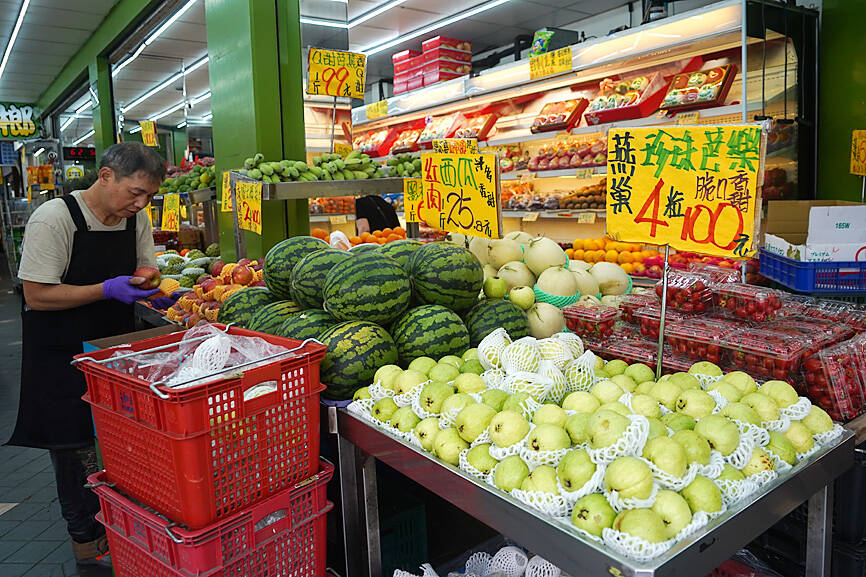The consumer price index (CPI) last month grew 2.29 percent from a year earlier, above the central bank’s 2 percent threshold and accelerating from the 1.58 percent increase the previous month, the Directorate-General of Budget, Accounting and Statistics (DGBAS) reported yesterday.
On a monthly basis, the CPI rose 0.04 percentage points, which the DGBAS attributed to price increases in eggs and fruits, despite price declines in vegetables, clothes and gasoline products.
“The annual increase of 2.29 percent in CPI last month came as fruit prices remained high due to the low post-typhoon recovery in harvests,” DGBAS official Tsao Chih-hung (曹志弘) told a news conference in Taipei.

Photo: CNA
Banana prices rose 107.32 percent and tomato prices increased 49.82 percent from a year earlier, the agency’s data showed.
Fruit price growth last month hit a more than eight-year high, and the increase in fruit and vegetable prices together contributed about 0.74 percentage points to the CPI growth last month, Tsao said.
Meanwhile, the cost of dining out rose by more than 3 percent for the fifth consecutive month last month.
Overall, the food price spike contributed 1.32 percentage points to the overall CPI growth in the month, he said.
The core CPI, which excludes vegetables, fruit and energy, grew 1.63 percent from a year earlier last month, below the 2 percent mark, Tsao said, adding that it indicated local consumer prices remained stable.
In the first three months of this year, the CPI increased 2.18 percent compared with the same quarter last year, the DGBAS said.
Asked whether the “reciprocal” tariffs of up to 32 percent on Taiwanese goods announced by US President Donald Trump, and which are to take effect today, would push up production costs and add inflationary pressure in Taiwan, Tsao said the public should not worry.
The US tariffs could also hurt demand, sending raw material prices lower, which is expected to cap price growth, he said.
“As the tariffs might negatively affect global and US economic activity, and weaken global demand and raw material prices, Taiwan faces no significant risk of rising inflation in the short term,” he said.
The CPI is unlikely to skyrocket this year due to the tariff effect, Tsao said.
Even if price hikes happen, the government would introduce measures to mitigate the impact, he added.
Meanwhile, the producer price index (PPI) rose 3.53 percent from a year earlier last month, largely due to an increase in prices of agricultural products, computers and optoelectronics as well as an increase in electricity rates, the DGBAS said.
In the first three months, the PPI rose 3.69 percent from a year earlier, the agency said.
Additional reporting by CNA

TAKING STOCK: A Taiwanese cookware firm in Vietnam urged customers to assess inventory or place orders early so shipments can reach the US while tariffs are paused Taiwanese businesses in Vietnam are exploring alternatives after the White House imposed a 46 percent import duty on Vietnamese goods, following US President Donald Trump’s announcement of “reciprocal” tariffs on the US’ trading partners. Lo Shih-liang (羅世良), chairman of Brico Industry Co (裕茂工業), a Taiwanese company that manufactures cast iron cookware and stove components in Vietnam, said that more than 40 percent of his business was tied to the US market, describing the constant US policy shifts as an emotional roller coaster. “I work during the day and stay up all night watching the news. I’ve been following US news until 3am

Six years ago, LVMH’s billionaire CEO Bernard Arnault and US President Donald Trump cut the blue ribbon on a factory in rural Texas that would make designer handbags for Louis Vuitton, one of the world’s best-known luxury brands. However, since the high-profile opening, the factory has faced a host of problems limiting production, 11 former Louis Vuitton employees said. The site has consistently ranked among the worst-performing for Louis Vuitton globally, “significantly” underperforming other facilities, said three former Louis Vuitton workers and a senior industry source, who cited internal rankings shared with staff. The plant’s problems — which have not

TARIFF CONCERNS: The chipmaker cited global uncertainty from US tariffs and a weakening economic outlook, but said its Singapore expansion remains on track Vanguard International Semiconductor Corp (世界先進), a foundry service provider specializing in producing power management and display driver chips, yesterday withdrew its full-year revenue projection of moderate growth for this year, as escalating US tariff tensions raised uncertainty and concern about a potential economic recession. The Hsinchu-based chipmaker in February said revenues this year would grow mildly from last year based on improving supply chain inventory levels and market demand. At the time, it also anticipated gradual quarter revenue growth. However, the US’ sweeping tariff policy has upended the industry’s supply chains and weakened economic prospects for the world economy, it said. “Now

COLLABORATION: Given Taiwan’s key position in global supply chains, the US firm is discussing strategies with local partners and clients to deal with global uncertainties Advanced Micro Devices Inc (AMD) yesterday said it is meeting with local ecosystem partners, including Taiwan Semiconductor Manufacturing Co (TSMC, 台積電), to discuss strategies, including long-term manufacturing, to navigate uncertainties such as US tariffs, as Taiwan occupies an important position in global supply chains. AMD chief executive officer Lisa Su (蘇姿丰) told reporters that Taiwan is an important part of the chip designer’s ecosystem and she is discussing with partners and customers in Taiwan to forge strong collaborations on different areas during this critical period. AMD has just become the first artificial-intelligence (AI) server chip customer of TSMC to utilize its advanced